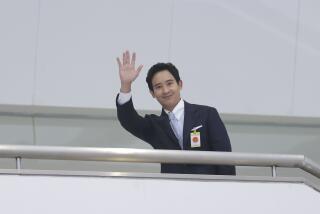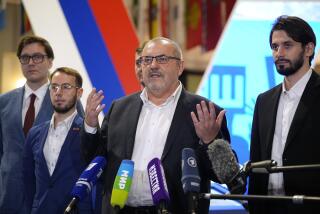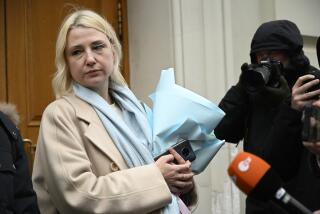Reformist Movement Is Allowed to Compete in Russian Campaign : Politics: Election panel’s snub of Yabloko bloc sparked popular outrage. Supreme Court’s ruling aids charismatic liberal leader.
MOSCOW — Russia’s Supreme Court ended a weeklong political drama Saturday by ordering that the reformist movement headed by liberal economist Grigory A. Yavlinsky be allowed to compete in Dec. 17 parliamentary elections.
The refusal last week by the Central Elections Commission to register the popular Yabloko bloc had been condemned by democracy proponents throughout Russia as a blatant attempt by those loyal to President Boris N. Yeltsin to manipulate the elections.
Yabloko and the charismatic Yavlinsky are likely to draw away much of the centrist vote that might otherwise go to the movement called Our Home Is Russia that is headed by Prime Minister Viktor S. Chernomyrdin and openly aligned with Yeltsin, who is hospitalized with a heart ailment.
“There is, after all, some hope for democracy in Russia,” Yavlinsky, 43, said as he left the courtroom where his appeal for registration was approved after two days of review.
Commission Chairman Nikolai T. Ryabov announced last Sunday that Yabloko had been disqualified because it had dropped candidates from its list of potential deputies after collecting endorsement signatures. The same procedural technicality was used to bar another Yeltsin rival, the Derzhava party of Alexander V. Rutskoi, the former vice president and 1993 coup leader.
The elimination of Yabloko had prompted another prominent reform candidate, former Prime Minister Yegor T. Gaidar, to threaten a boycott of the December vote unless the decision was rescinded.
Gaidar warned that exclusion of a leading democratic movement would relegate the elections to “a dangerous farce.”
As popular outrage mounted over the commission’s actions, Yeltsin weighed in from his hospital bed Tuesday to demand an explanation from Ryabov as to why he had refused to register Yabloko and Derzhava. The presidential press service later said Yeltsin was satisfied that legal procedures were being followed with the appeals for Supreme Court review.
On Friday, the high court ordered the registration of Derzhava, or the Great Power party, but said it needed more time to consider the appeal of Yabloko, which means apple in Russian but is actually an acronym composed from the names of the movement’s three founders. The ruling in Yavlinsky’s favor late Saturday was made without explanation.
If the motive in excluding Yabloko was to force voters to support Yeltsin and Our Home Is Russia, it may have backfired: Yavlinsky has soared to political martyrdom and has been cast by the heavy-handed tactics as the candidate to beat.
As sympathy for Yavlinsky escalated, his competitors sought to portray Yabloko’s banishment as self-induced.
Sergei G. Belyayev, a leader of Our Home Is Russia, called the procedural violations “a public relations stunt,” and Communist Party leader Gennady A. Zyuganov also accused Yavlinsky of provoking the confrontation to elevate himself in the eyes of voters.
Yabloko officials played down any positive effects of their initial disqualification and the scandal that ensued.
“We did not want any additional popularity at this price,” insisted Timofei V. Guzhechenko, a lawyer for the movement now regarded among Western diplomats as the most supportive of market-oriented reforms.
“We do not want to be involved in scandals,” Yavlinsky told Russian state television after the ruling. “Scandals are what we don’t need, and such publicity is unnecessary for genuine politicians who want to do something for their own country.”
Whether intentional or accidental, analysts say the initial attempt to bar Yabloko is likely to inflict damage on the credibility of the elections commission, not Yavlinsky.
“The big benefit out of this will be for Mr. Yavlinsky,” said Michael McFaul of the Carnegie Endowment for International Peace. “It gives him headlines. It makes him look like the one they’re really afraid of.”
But by trying to exclude two obvious Yeltsin rivals from a parliamentary race widely seen as a testing ground for next June’s presidential election, the elections commission took on the appearance of trying to act on behalf of the standing president.
That appearance of bias revived questions about the fairness of the parliamentary campaign, which is only the second contested ballot in Russia since one-party rule ended with the Soviet Union’s breakup in 1991.
More to Read
Sign up for Essential California
The most important California stories and recommendations in your inbox every morning.
You may occasionally receive promotional content from the Los Angeles Times.











